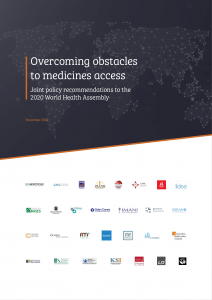Overcoming Obstacles to Medicines Access – Toward the 2020 World Health AssemblyJoint policy recommendations to the 2020 World Health Assembly
Overcoming Obstacles to Medicines Access
Joint policy recommendations to the 2020 World Health Assembly
Competere is part of an international coalition of public policy research institutes and think tanks that believes that collaboration, open trade and innovation is crucial to the response to Covid-19.
READ THE POLICY RECOMMENDATIONS – LEGGI LE NOSTRE RACCOMANDAZIONI >>
As the 2020 World Health Assembly re-convenes in Geneva, we urge governments to commit to simple reforms that will accelerate access to medicines, including those in the process of being developed for Covid-19.
These reforms will have benefits that last beyond the current pandemic, increasing access to medicines for all. Reduce unnecessary medicine costs by:
- Abolish tariffs and taxes on medical supplies and medicines
- Reject export bans on medical supplies
- Reduce customs red tape.
Accelerate access to medicines by:
- Simplifying the drug approval process
- Modernising government medicine reimbursement decision-making
- Promoting genuine free trade in medicines
- Supporting the innovation system.
The reforms needed (toward the 2020 World Health Assembly)
In the majority of developing countries, most healthcare costs are met directly out of pocket due an absence of functioning healthcare insurance and delivery. To improve access to medicines, governments should take steps now to remove unnecessary medicine price inflators, many of which are self-imposed.
In many countries domestic taxes can make up 20-30% of the final price people pay for medicines. Countries at all spectrums of economic development apply VAT on medicines. Other taxes include state excise duty, stamp duty, community tax and other fees. In lower and middleincome countries, the range of total tax is 5%-34%. These taxes are regressive, undermine access to medicines and generate little revenue (between 0.03% and 1.7% of total tax revenue).
Innovative vaccines and therapeutics will be essential to ending the Covid-19 pandemic, and also to tackling the rising burden of non-communicable diseases that accompany ageing and more affluent populations throughout the world. Sadly, patients in developing countries wait longer for these innovations. There are several reforms which could address this problem:
- Speed up the process of drug regulatory approval
- Get medicines onto public formularies more quickly
- Promote open markets in medicines
Biopharmaceutical innovation will play a pivotal role in resolving the Covid-19 crisis, both in the form of new treatments that can mitigate the worst effects of the disease, and ultimately a preventative vaccine. Such life-saving technology is less likely to be forthcoming if governments sacrifice intellectual property (IP) rights, even before such technologies have been invented.


